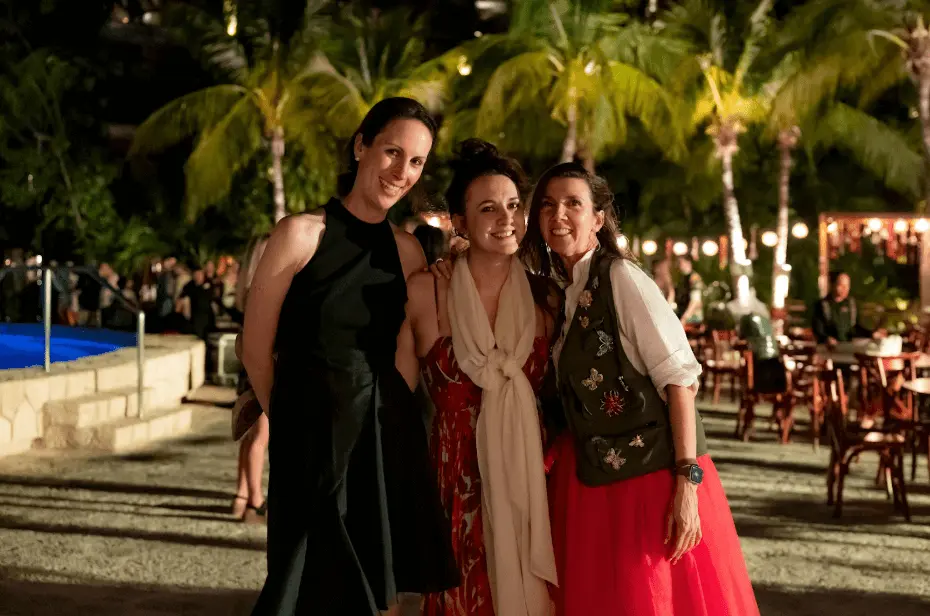
Meet Leslie Pierce-Connor, Kevel’s General Counsel and resident legal powerhouse. Based in Hanover, New Hampshire, Leslie has been with Kevel for nearly four years, bringing sharp expertise in corporate law — along with a healthy dose of humor and pop culture flair. Whether she’s giving presentations on Taylor Swift’s IP strategy or structuring high-impact acquisitions, Leslie proves that legal work doesn’t have to be stuffy to be seriously effective.
Leslie’s path to Kevel started with a connection from a previous company and a well-timed nudge after starting a family.
“I used to work with Kevel’s former Director of Security and Privacy. A few months after she started at Kevel, she convinced leadership they needed me,” Leslie recalls. “I actually met with them right after my son was born — and after meeting James, I was sold. I thought, ‘I will follow you anywhere.’”
She joined Kevel remotely during the tail end of COVID, immediately drawn to Kevel’s flexible, remote-first approach and the trust it placed in its people. “With my husband’s job we move every couple of years,” she explains. “So being able to work remotely was incredible.”
A good General Counsel advises the business on strategy from end to end, with a deep understanding of how initiatives across every department may be impacted by statutes, regulations, and overall risk. The role is far more than legal oversight — it’s a blend of strategist, risk navigator, and trusted advisor.
“It surprises people how entrenched a lawyer needs to be in every aspect of the business,” Leslie explains. “You need to understand the business and the product, how we approach customers, and even how we frame our marketing strategy in order to do the job well.”
At Kevel, Leslie’s work touches nearly every team, helping ensure that company decisions are not only legally sound and risk-informed, but also aligned with broader business goals. And while the role takes on a great deal of responsibility, Leslie brings her trademark wit to it: “I help keep Kevel out of jail.”
“It would probably be closing the Nexta acquisition,” Leslie reflects. “It was a smart, well-executed transaction, and a really great investment that helped accelerate the product offering and growth.”
While it wasn’t her first acquisition at Kevel, it marked a significant milestone for the company — and for Leslie personally. “It was really great to be able to take the lead on a lot of the compliance aspects — making sure we’re combining the businesses and forging a path forward in a way that’s really intelligent.”

“The biggest one, for in-house lawyers, is the myth that we’re here to say ‘no,’” she explains. “We definitely have the reputation of standing in the way of progress, of being a blocker. That is true for some lawyers, but that is not what a good lawyer does. A good lawyer says, ‘Yes, but…’ We might have to find a different way, but here’s how we can do it, or let’s work together to figure it out.”
Another misconception Leslie points out is about law school itself. While it teaches you how to think about the law, Leslie explains, it doesn’t teach you how to be a lawyer. You learn from the job.
“People who say, ‘I’d be a great lawyer because I love to argue…'
That will actually make you a bad lawyer.”
Also: lawyers aren’t as serious as you might think. “You can definitely approach the law in a way that’s fun and you don’t have to be serious all the time,” Leslie says. “I’ve given talks on Taylor Swift’s IP strategy, My Cousin Vinny, and the Real Housewives and their realer crimes. Lawyers can be fun!”
According to Leslie, the next few years will bring significant regulatory changes — especially at the intersection of privacy and artificial intelligence. She notes that this shift feels like history repeating itself: “It’s really mirroring the way that privacy regulations rolled out in the U.S. after the GDPR. We’re seeing global frameworks in Europe take the lead, with U.S. states taking bits and pieces from that.”
“Any business planning to use AI should consult with legal counsel, internal or external, to really talk through how AI impacts their business. It’s highly fact-dependent: What vertical are you in? What kind of data do you process? Is the AI trained on your data? Developing a clear set of core principles for AI use from the outset is essential.”
The conversation is also evolving from questions of data collection to broader questions of AI ethics. “It's really about pivoting away from just, ‘What’s happening to my personal data?’ to ‘How does AI impact that data, and how can I use AI in a way that’s ethical and responsible?’”
At Kevel, the approach is proactive: anticipate changes, exceed current standards, and scale responsibly.
“I think for several months there was this real hesitation to use AI — but now AI is a foregone conclusion. You have to use AI to stay effective with the way that things are changing. But we’re doing it responsibly: protecting customer and employee data, tracking regulations closely, and developing internal best practices that are even more stringent than what’s legally required — while still accelerating our work. We're not going to sit back and let anybody lap us.”
“I have been trying to learn a little Danish,” Leslie shares, referencing an upcoming trip to Copenhagen. “My husband and I do this thing where, before we travel to any foreign country, we'll spend about a month learning vocabulary. It's really helpful for recognizing words and signs while you’re somewhere new.”
Leslie’s passion for languages and travel isn’t new — she lived in Korea for two years before moving back to the U.S. just a few months before her son was born. “We spent a lot of time studying Korean,” she shares. “Using workbooks and watching slow conversation videos on YouTube.”

Without hesitation, Leslie points to Kevel’s core value: “We are all adults.”
“I came over to Kevel because I had the opportunity to work autonomously and build a function that didn’t previously exist the way I wanted to see it,” she says enthusiastically. “That took a lot of trust from leadership, but I’ve never thrived with micromanagement. Give me trust, and I’ll do everything I can to keep it.”
“We are all adults: We believe in creating structures and processes that allow people to work the way that they work best. We want to minimize bureaucracy and red tape in favor of creating an environment that fosters both professionalism and humanity in how Kevelers interact.”
- Kevel Constitution & Values
She believes Kevel’s culture of autonomy empowers people to take initiative, do their best work, and feel a true sense of ownership: “I think the more trust you put in people, the more they are going to rise to meet your expectations.”
For Leslie, Kevel’s culture of trust and autonomy is foundational — not just to how she works, but to how she lives. “Kevel’s culture fosters a safe space for innovation,” she explains. “People aren’t afraid to bring up ideas, try new things, or challenge the status quo.”
That openness stands in stark contrast to some of her previous experiences, where fear of breaking the traditional chain of command often discouraged progress. At Kevel, she feels empowered to make decisions and take action — because that trust is built into Kevel’s DNA.
Leslie also points to Kevel’s remote-first policy and flexibility as key enablers of her personal and professional growth. “I’ve been able to move states, raise a child, and keep doing meaningful work,” she says. “That’s not really something every company can offer — and it’s a big reason I’ve been here nearly four years.”
For Leslie, Kevel is a place where she can lead boldly, live fully, and still be entirely herself:
“You can do a good job and still be fun. Having good relationships throughout the business and being approachable, and being fun, is actually going to make you more effective at your job — not less.”